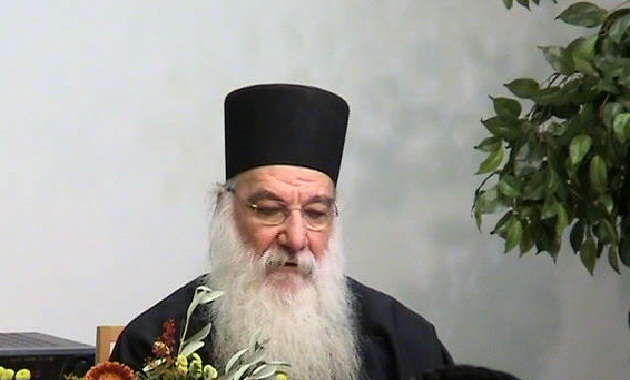Fr Moses the Athonite as Poet and Author
18 February 2016[Previous Publication: http://bit.ly/244pWeW]
He has published four poetic collections: Ηπειρωτική Ηλιοφάνεια (Mainland Sunshine),[13] Αγιορείτικες Πέτρες (The Stones of Mount Athos),[14] Αθωνικά Ποιήματα (Athonite Poems)[15] and Αθωνικό Ψαλτήρι (Athonite Psalter).[16] In addition, some of his poems have been published in poetic anthologies and journals and some others have been set to music.[17] His poetry has been awarded prizes from ‘Χριστιανική Ένωση Νέων Κηφισιάς’ (‘Christian Union of the Youth of Kifisia’) in 1971, ‘Χριστιανική Λογοτεχνική Συντροφιά’ (‘Christian Literary Company’) in 1985, ‘Διεθνής Εταιρεία Ελλήνων Λογοτεχνών’ (‘International Company of Greek Writers’) in 1995 and ‘Μακεδονική Καλλιτεχνική Εταιρεία: Τέχνη’ (‘Macedonian Artistic Company: Art’) in 2006.[18]
Also, Fr Moyses has written several books about monastic life and Mount Athos, like Άγιον Όρος και Κοινωνία (Mount Athos and Society)[19] and Ορθόδοξος Μοναχισμός (Orthodox Monasticism).[20] He wrote books, like Ο Όσιος Τελώνης και ο Άγιος Άσωτος (The Blessed Publican and the Prodigal Saint)[21] which analyze aspects of Orthodox Christianity, as well as others in the form of personal diary which describe his monastic life, like Αγρυπνία στο Άγιον Όρος (Vigil on Mount Athos)[22] and Αγιορείτικο Μεσονυκτικό (Midnight on Mount Athos).[23]
In The Blessed Publican and the Saint Prodigal, Fr Moyses deals with certain issues of Orthodoxy. He discusses the parable of the prodigal son and his repentance, the significance of the Three Holy Hierarchs in Orthodoxy, the role of the cross and the Orthodox education of children. Some of these issues are also reflected in his poetry. For instance, in the poems ‘Η Επιστροφή του Ασώτου’ (‘The Return of the Prodigal’)[24] and ‘Η Υποδοχή του Ασώτου’ (‘The Reception of the Prodigal’),[25] Fr Moyses, who obviously alludes to the parable of the prodigal son,[26] attempts to show the role of metanoia or repentance in Orthodoxy. After his return to his paternal home, the words of the prodigal son in the two poems denote his repentance and confession. The prodigal son appears to understand that it was a mistake to leave his father’s home. Thus, the issue of Fr Moyses’ poems is repentance.
According to Arvanitis, Fr Moyses’ contribution to poetry is significant. Fr Moyses uses free verse, but his lyrics are harmonic and their content is strictly associated with asceticism.[27] His poems are characterized by a lyrical atmosphere, which links with Orthodox tradition.[28] Pillas maintains that the perfume of Orthodoxy permeates the poetry of Fr Moyses, while love and true faith constitute the main characteristics of his poems.[29] They contain a pure care and interest for people as well as deep spirituality, while some poems illustrate great understanding of people’s spiritual state.[30]
Paschos states, that Fr Moyses’ poems are characterized by a distinctive way of confronting contemporary society’s burning questions and by illuminating them with the Orthodox tradition and monastic experience. This element attracts Fr Moyses’ readers.[31] Also, Nikolaidis asserts that Fr Moyses’ poems are characterized by depth and real substance, which denote the tragedy of human in nowadays.[32]
[To Be Continued]
[13] Μοναχού Μωυσέως Αγιορείτου, Ηπειρωτική Ηλιοφάνεια (Ioannina, 1984). My translation.
[14] Μοναχού Μωυσέως Αγιορείτου, Αγιορείτικες Πέτρες (Ioannina, 1985). My translation.
[15] Μωυσέως Αγιορείτου, Αθωνικά Ποιήματα, My translation.
[16] Μωυσέως Αγιορείτου, Αθωνικό Ψαλτήρι. My translation.
[17] Μωυσέως Αγιορείτου, Αθωνικό Ψαλτήρι, 51-52.
[18] Μωυσέως Αγιορείτου, Αθωνικό Ψαλτήρι, 52.
[19] Μοναχού Μωυσέως Αγιορείτου, Άγιον Όρος και Κοινωνία (Athens, 2009). My translation.
[20] Μοναχού Μωυσέως Αγιορείτου, Ορθόδοξος Μοναχισμός: Συνοπτική Αναφορά στην Ιστορία, την Αξία και την Προσφορά του (Athens, 1995) . My translation.
[21] Μοναχού Μωυσέως Αγιορείτου, Ο Όσιος Τελώνης και ο Άγιος Άσωτος (Athens, 2010). My translation.
[22] Μωυσέως Αγιορείτου, Αγρυπνία στο Άγιον Όρος. My translation.
[23] Μωυσέως Αγιορείτου, Αγιορείτικο Μεσονυκτικό. My translation.
[24] Μωυσέως Αγιορείτου, Αθωνικά Ποιήματα, p. 47. My translation.
[25] Μωυσέως Αγιορείτου, Αθωνικά Ποιήματα, p. 48. My translation.
[26] Luke 15: 11-32.
[27] Nikos Arvanitis in Μωυσέως Αγιορείτου, Αθωνικό Ψαλτήρι, 52.
[28] Arvanitis in Μωυσέως Αγιορείτου, Αθωνικό Ψαλτήρι, 52.
[29] Antonios Pillas in Μωυσέως Αγιορείτου, Αθωνικό Ψαλτήρι, 53.
[30] Pillas in Μωυσέως Αγιορείτου, Αθωνικό Ψαλτήρι, 53.
[31] Pantelis Paschos in Μωυσέως Αγιορείτου, Αθωνικό Ψαλτήρι, 58-59.
[32] Ioannis Nikolaidis in Μωυσέως Αγιορείτου, Αθωνικό Ψαλτήρι, 63-64.







